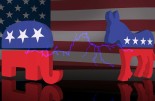Pim Poppe: Drenched in sweat
Pim Poppe: Drenched in sweat

This column was originally written in Dutch. This is an English translation.
By Pim Poppe, Managing Partner at Probability & Partners
Last night, I woke up at 4:37 a.m., drenched in sweat. It was a nightmare. I had been dreaming about all sorts of things. Half asleep, half awake, I jotted down five words on the HEMA notepad that always lies on my bedside table. Then I tossed and turned for a few more hours.
Let me take you into my dream. Forgive me, it's chaotic. I can't help it. The dream was in control, not me. Here we go. We were living a few years in the future. The dream didn't specify the year, but it must have been ten years from now, say 2035. America had become a totalitarian state. The government debt had been stamped out and the stock market nationalised. There was no longer a free press. Surveillance was everywhere, with cameras and microphones in a fantastic coalition between the smouldering remains of what was once Big Tech and the totalitarian government. There was poverty and social unrest. The repressive government had many deaths on its conscience. The United States was politically and economically isolated. Inflation had been excessive for a few years, but had since disappeared.
The history of the past five decades had taught us that old hegemons are overcome by new ones, thanks to innovation and economic and military power (think of Spain, the Netherlands, Great Britain, the US). But this time it was different. The US had allowed itself to implode, which in hindsight was predictable.
Economically, Europe was doing reasonably well. It had to: after all, we were standing on our own two feet. The arms industry and deregulation had done a lot of good in the decade after 2025, but they could not fully compensate for the geopolitical economic fragmentation and the decline of the United States. We were still there, thank God, but we were impoverished.
There was a lot of mudslinging in Europe. Why did we not see the accelerated dethroning of the US as a hegemonic power coming? Why did we do nothing? There were arguments in Europe about who was to blame at every level: the EU, the Netherlands, the business community, pension funds. Parliamentary inquiries. All water under the bridge now. Hindsight is 20/20.
The discussion in pension land was remarkable. One large fund had sold its American investments in 2027 and was therefore not affected by the nationalisation of shares and the write-down of government debt. The other funds were. Now, in The Hague, it was decided that this fund should transfer funds to the other funds, which had lost up to 40% of their assets. The fund had to show solidarity. Very unusual.
Although isolated, China was doing reasonably well. There, the market still worked for the state. The state fulfilled its role as market regulator reasonably well. This proved to be a better recipe than the mistake made by the US in the 1920s, where the state worked for the market and shareholders. The transition from export-led to consumption-led growth had also been successful in China, albeit with some hiccups. The business community had to deal with a predictable government.
The dream was fermenting with the ingredients of my preparation for a follow-up to my previous column of 8 April, How crazy can it get. That column seemed excessive at the time, but after four months it no longer did. Yesterday, I was studying everything that had happened since that column:
- The attack on Fed Chairman Jerome Powell along the axis of renovation costs.
- Vague agreements with trading partners on imports that are presented as deals.
- An effective import tariff of 18% (after an average of 2% over the past two decades).
- The first serious signs of stagflation.
- Disappointing job figures.
- Denial of those signs.
- The resignation of the head of the statistics bureau.
- Redrawing of electoral districts to ensure Republican victories.
- The dismantling of science.
- A deal between Nvidia and the government to export chips to China for 15% of sales.
- Fear of expressing your opinion at work.
It has become a large marketplace where money, morality, political power, public health, tariffs and personal feuds are all interchangeable. Exchange rates are daily rates. Uncertainty reigns.
Other infiltrations into my dream came from the books of Yuval Noah Harari, such as 21 Lessons for the 21st Century. In it, he explains how totalitarian states such as Nazi Germany and the Soviet Union had limited technical resources. Those regimes would dream of what is possible today. Today's technological resources make it easy to gain complete control over citizens. Without a functioning democracy as a counterforce, we are heading in that direction.
The photo of the Big Tech bros at Trump's second inauguration kept coming back to me. A symbol of the renewed relationship between Big Tech and Trump. Wasn't that a red flag? A picture says more than a thousand words. Especially in a dream.
Another snippet: we knew it, didn't we? Every time a totalitarian regime comes to power, the stock market is nationalised. Think of St. Petersburg in 1917, Havana in 1960, Prague in 1948, Shanghai in 1949. And we thought it couldn't happen during the Trump 2 revolution.
Luckily, I just got up. A nice cup of coffee, the sun is shining today. It's going to be tropical in the coming days. Lovely. It was just a dream. Time to get to work.
No more worrying.










